Teen Pregnancy: From Shame to Success
“You will never amount to anything,” her mother yelled.
“How could you be so stupid?” her father asked.
“You think you are ready to be a parent, Chrissy? You think it is easy caring for another human being?” her mother’s voice boomed.
She continued, ” You still live in my house with me. What are you going to do with a baby? You just ruined your whole life. Get out of my sight.”
Chrissy walks up the stairs to her room with her head held down. She sits on her bed and rubs her stomach. “It’s just you and I against the world, baby, and no matter what, I will always love you” she says.
Chrissy represents any teen who faced the reality of becoming pregnant at an early age. The shame that society puts on them for having a child before a career makes them feel like they will not amount to anything. They live day by day with the shame of becoming pregnant mounted on their shoulders. The stares and the snickers behind their backs make them feel horrible. It’s a struggle to achieve a degree after having a child but it’s not impossible. Many teen mothers have shown they they can rise above the stigma and live a successful life.
In 2013, 273,105 babies were born to mothers ranging from 15 to 19 years-old. The birth rate for girls ages 15 through 17 dropped 13 percent, and for ages 18 and 19 it has dropped 8 percent. Although it has dropped, the birthrate for New York is still substantially higher than other states.
Race is often said to play a part when it comes to teen pregnancy. A female who is African-American or Hispanic is said to have a higher chance of being pregnant young than any other ethnicity. The Hispanic birth rate was 25.5 percent, while the birth rate overall was 14.1 percent. Seventeen percent of Native and Alaskan Americans became pregnant in 2012. That same year, 21.9 percent of black teens were pregnant. White and Asian teens had the lowest birth rate of 8.4 and 4.1 percent.
There are many reasons that are believed as to why Hispanic teens get pregnant at an early age. These reasons are because of culture, religious beliefs, access to medical services, and lack of financial resources, according to Pew Research Center.
There are many myths about teen pregnancy. The first one is that teen pregnancy is on the rise, yet statistics show that teen pregnancy has decrease tremendously over the past few years. The second one is a female can’t get pregnant the first time she has sex. This is also no true. If a woman doesn’t use protection, she can get pregnant the first time she has sex.
The third myth is that teen pregnancy is mostly an urban problem. Although teens that live in a urban area tend to get pregnant a little more frequently, a study has shown that rural areas have a one third higher birth rate.
The fourth is that teen pregnancy rates are only dropping for white teens. This is another fact that has been proven to be false. The birth rate for all races has dropped. It has dropped 64 percent for Asian teens, 56 percent for Hispanic teens and 63 percent for black teens.
The fifth one is teen pregnancy is no worse in America than in most other countries. Although teen pregnancy is current in other countries, the U.S. still has a higher pregnancy rate.
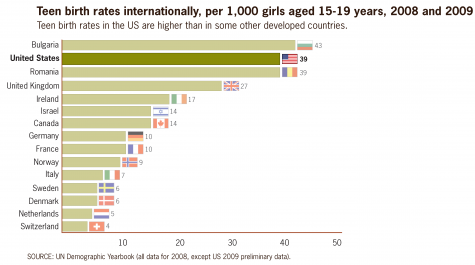
Lastly, is the sixth which is all teen pregnancies are unintended. In some cases they are intended because they want to be a parent early in life. Just because you hear something doesn’t mean it is always true.
Shiloh Watkins is currently a student at Mercy College. She found out she was pregnant her second semester of her junior Year. “I was scared because I traveled from New Jersey to the Bronx everyday,” she says. Growing up as a preacher’s kid didn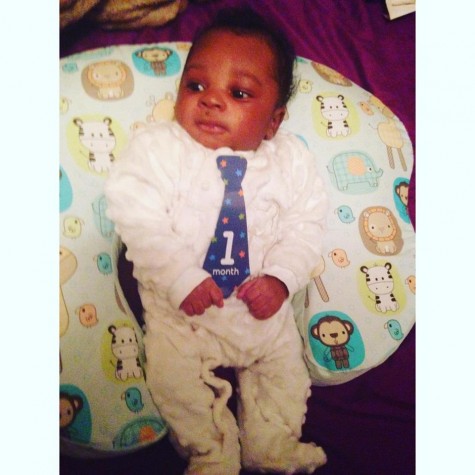 ’t make her situation any better for her. Preacher’s kids are supposed to uphold this image and do the right things so others can follow in their footsteps, she says.
’t make her situation any better for her. Preacher’s kids are supposed to uphold this image and do the right things so others can follow in their footsteps, she says.
“Once I told my parents everything went crazy; my mother was okay with it sort of but my father wouldn’t speak to me,” said Watkins.
Since her father was the pastor of the church, he was worried about his image, Watkins felt. She told the church and everyone was accepting, but then again, she says, “what could they do?” She went about her time and finished her semester strong. Her following semester, which was the beginning of her senior year she decided to take online classes. She was due that October so it was better for her to take online classes rather than travel and have to miss class because of her having her baby. She continued to do what she was supposed to.
“The day after I had my son, I was right back in my computer doing my work,” she says. She learned how to balance motherhood and school. She went to find a job that was better suited for her major. She currently works two jobs and takes online classes. When asked if she would change the fact that she had her son at a young age, her response was “No, I wouldn’t change a thing because he was sent for a reason and I’m happy he’s here.”
Jada Romero of the Bronx was only seventeen when she had her son. She was adopted by her grandmother when she was young. Throughout her life she never knew what it was like to live with her parents. She was pregn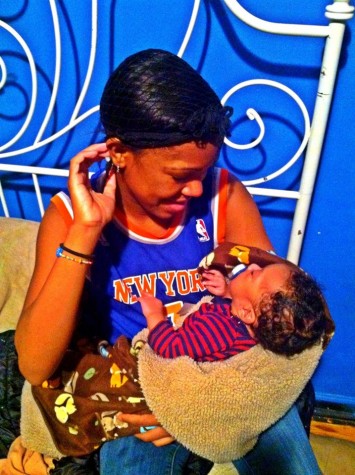 ant at sixteen and gave birth to her son when she was 17 years old.
ant at sixteen and gave birth to her son when she was 17 years old.
“It was hard for me, and I was in denial that I was actually pregnant,” she said.
She left her grandmother’s house and started staying with her son’s father and his family.
“I walked around like I belonged there, and he wasn’t a good influence. He didn’t encourage me to go to school or anything like that, and because I was staying with him, I felt that I should do what he asked me to,” says Romero.
She would stay in the house all day and watch television. She had no ambition or wanting to do better.
“It was time I finally got out of denial and we told his mother I was pregnant and she didn’t say much, all she did was say ‘I figured you were.’”
As she started preparing for her son’s arrival, she knew she had to do something. “I started looking for jobs and I knew I didn’t want to go back to my school, so I started looking into GED programs,” says Romero.
She knew she needed to better herself. She was prepared to break the cycle. Both her mother and sister had children young and she didn’t want the same for her son. Romero wasn’t able to get her high school diploma so she is currently in a GED program. When asked if she would change the fact that she is a teen mom her response was, “No, my son makes me want to be a better person and I wouldn’t change the fact that he is here for anything.”
***
Many people believe a theory that once a woman has a child young, she will no longer be able to get her degree. People often feel that a child is a major setback if the parents aren’t already established. This isn’t the case for all women. A lot of women have children before they are able to finish school and get their degree. Without a degree, it is hard to get a high paying job. Without a good paying job, it is hard to make ends meet. Once one has a child, life is no longer about just the parent. She now have someone that she has to care for. It is a whole different ballgame once she have a child.
Although having a child young can be a task in some cases, having a child makes a person strive harder and want to do better in life, like Evette Brutus of Brooklyn.
In March 2013, Brutus found out she was pregnant during her junior year of high school. In denial, Brutus had a feeling that she might be pregnant and went to the local drugstore to pick up tests. All came out negative. Brutus was relieved. The following week at school, her friend Neja commented on how much she was eating at lunch. Brutus knew she wasn’t pregnant. Neja kept mentioning that she’s eating more than normal and asked if she might be pregnant. Brutus said “no” after explaining that she took three pregnancy tests and they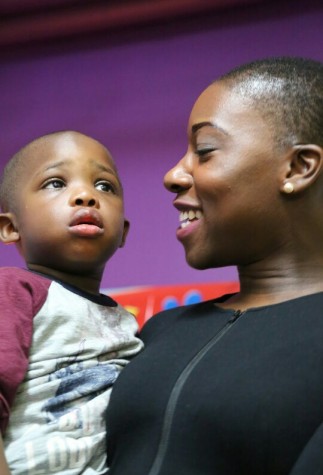 came back negative. Her friend felt otherwise and forced her to go to the doctor.
came back negative. Her friend felt otherwise and forced her to go to the doctor.
The doctor entered the room saying “Congratulations!” and Brutus thought it was a mistake. She couldn’t be pregnant, there was no way. But she was and her whole life would never be the same.
Brutus never thought this would happen to her. She scrutinized other girls who became young mothers, looking at them and saying “they should have been more careful.” The tables had turned and she was now one of them.
“I felt embarrassed. I looked at life from a whole different perspective. I felt sorry, I felt terrible for everything that I said I would never do and did,” Brutus said.
After finding out she was pregnant, she had to think of a way to tell her mother the news. She was terrified. Brutus and her mother always had an honest relationship but this would be the hardest thing to say. Saying it face to face would be too difficult, so she called her. Brutus dialed her mother’s number and waited for her to pick up. Once she did, Brutus got right to the point.
“Mom, I’m pregnant.”
She heard silence on the other end followed by screaming. In shock, her mother dropped the phone. Brutus’ sister picked it up and started yelling at her.
“When did this happen?”
“Who’s the father?”
“What are you going to do?”
Brutus was overwhelmed, she didn’t need this. Having everyone screaming and yelling didn’t make the situation easier. She was already disappointed in herself. Her sister told her to come home and they will figure this out.
Although Brutus didn’t let many people know she was pregnant, news started to spread that she was. The church is where she felt the most comfortable however, when they found out, they shunned her. Her church “family” found out she was pregnant and didn’t look at her the same way. They made constant reference to her being “the church girl” and her not upholding the wholesome image of what that meant. The judgement she felt was too much to handle.
“I’m already beating myself up because I’m 18, I’m pregnant, and I’m still in high school,” Brutus said.
With regret, sadness, and disappointment mounted on her shoulders, she didn’t see how she was going to make it through. Through much perseverance, Brutus finished the eleventh grade at the Brooklyn School for Music and Theatre. The goal was to graduate high school but timing wise, it didn’t seem possible. Her son Tyller would be born in five months. The only way she would be able to finish early is to go to an alternative school. Alternative schools offer students the chance to complete high school through a different curriculum than regular schools, under a quicker time span. Brutus went to Brooklyn Academy to start her final year of high school.
In September, Brutus was seven months pregnant. Being that much closer to her due date made school even harder. She didn’t believe that she would graduate. Clouds of negativity lingered over her head. She wanted to prove to everyone else and herself that she could graduate high school.
“I had to really pray and ask God to help me. I had to block everyone out,” Brutus said.
Despite the hardships, Brutus was in school every day and completing all assignments. At nine months pregnant, her school gave her time off to have her baby. In November, Brutus gave birth to a healthy baby boy named Tyler. She was happy to have her son. She never thought she could love someone as much as him. Two months after giving birth, Brutus graduated from high school.
Currently, Brutus is in college, majoring in journalism. It’s not easy juggling school, work, and being a mother. Brutus gives credit to her son for motivating her to become a better person. Having a child at 18 years old was the hardest thing to go through but Brutus couldn’t imagine life without Tyler.
“He really added flavor to my life. He’s the straw to my berry,” Brutus said smiling.
***
Teen pregnancy, the formally taboo topic has become the focus for many movies and TV shows, all depicting how motherhood can be. In 2007, the film Juno premiered at the Toronto International Film Festival. Actress Ellen Page plays the title character, a 16-year-old high school student who discovers she’s pregnant and is forced to deal with adult responsibilities. Juno doesn’t feel that she can take care of a child and contemplates having an abortion. Going to the clinic changes her mind and she ultimately decides to give up her baby for adoption.
In 2009, MTV aired the show 16 and Pregnant, which followed the lives of six young, expecting teenagers. The girls featured in the show wanted to document their journeys to show teenagers the reality of being young mothers. They wanted young people to learn from their actions and make better decisions in their own lives. The show received mixed reviews. Some parents and educators believed that 16 and Pregnant glamorized pregnancy. While others thought it was a true representation of what having a baby is like. In response to the critics, MTV created a spin-off show, Teen Mom. It followed the mothers from 16 and Pregnant, showing what life is like months after they give birth. The show featured teenagers Maci Bookout, Amber Portwood, Farrah Abraham, and Catelynn Lowell. Cameras followed the young mothers as they dealt with raising a child, struggling financially, disputes with parents, going to school, and watching their friends go to college.
Society makes it seem as though having a baby stops your from living your dreams but that isn’t the case. Watkins is due to graduate next month with her Bachelors from Mercy. Although she has a baby that didn’t stop her from getting her degree. Her son is six months old and she balances being a mom, working, and going to school. She shows that it can be done.
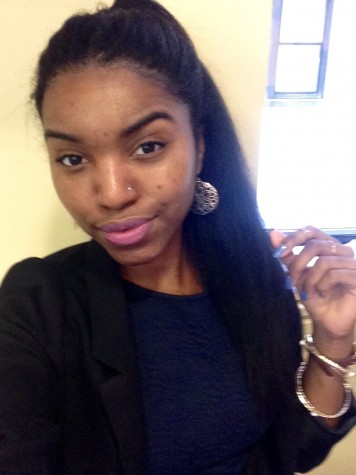
Shantal Marshall is from Brooklyn, New York and majors in journalism at Mercy College. Her hobbies include reading O magazine, listening to music, and...

Tanasia Patterson is from the Bronx. She attends Mercy College as a journalism major. Her hobbies are reading, dancing, and singing. She is planning to...







